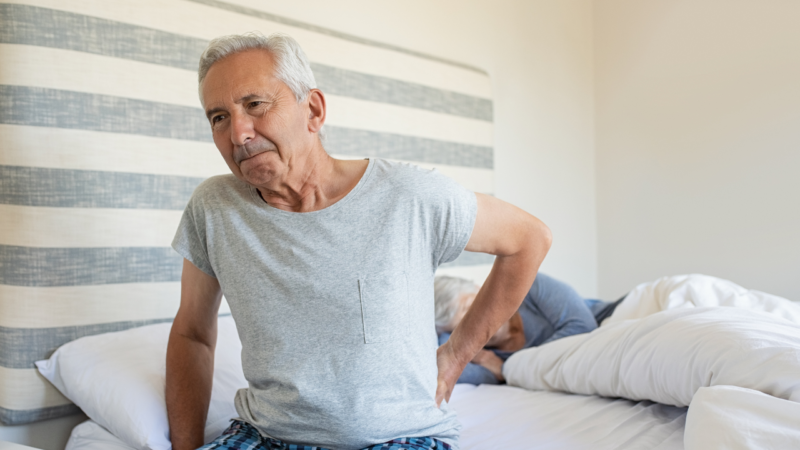IMAGINE THIS: You wake from a deep sleep; your eyes blink open. You feel the cool morning air as you remove the blankets and venture into the day ahead.
Then …. uh oh, something stops you in your tracks! You feel a tight pull and a nip of pain as you begin to move. Your muscles feel tight and stiff, and you start your day off frowning, as you struggle to get comfortable.
Sound familiar?
You’re not alone. Sadly, this scene is all too familiar for most of us and leaves us asking the question, is there anything I can do to prevent, or at least reduce, stiffness in the mornings?
The good news is – yes!
In this article we will explore some tried and tested ways to reduce or prevent muscle and joint stiffness in the mornings.
First of all, what causes stiffness?
There are multiple causes of joint stiffness but most commonly it follows periods of inactivity.
Movement promotes synovial fluid production in our joints. Think of this fluid as your body’s natural lubricant for the joints. Remember the ‘Tin Man’ in the Wizard of Oz? Getting moving is one of the keys ways to activate synovial fluid production in our joints and acts as the ‘oil can’ of the body!
Sleeping is often when we spend the longest period of time inactive, which is why it is common to feel tight and stiff upon waking. Inflammation in the joint due to arthritic conditions and age-related degeneration can also be contributing factors to morning stiffness.
What can be done to alleviate morning stiffness?
Here are five things you might like to try:
1. Ensure you are active throughout the day – as mentioned above, the body loves movement. Regular moderate activity is not only recommended for general health and wellbeing but is also useful in reducing the pain and stiffness you feel in the morning.

2. Get a good night’s sleep – in a previous article, TPC physio Kathy Soo highlighted that sleep was essential for mind and body repair. Getting adequate sleep will lead to the body having time to restore itself and help you feel more refreshed come morning.
3. Sleeping position – ensure you are sleeping in a well-supported, neutral position overnight to avoid muscle strain and awkward joint positions. Try to avoid sleeping with your neck, back or shoulders twisted or turned to the side at an uncomfortable angle. This is especially important if you are a tummy sleeper. Odds are if it’s slightly uncomfortable falling asleep it will be very uncomfortable after eight hours! Be mindful of how your body feels as you are falling asleep and make adjustments as necessary.
4. Stretches as part of a wind-down routine – gentle stretches as part of a wind-down routine can help improve blood flow and relieve muscle tension. This not only makes for a more comfortable night’s sleep but also helps the body repair itself overnight.
5. Get warm quickly – have a nice hot shower in the morning. A dose of warmth to the body will open up the blood vessels, promote blood flow and help tense muscles relax.
Okay, there is a fair bit there!
The key thing to remember that doing a little bit is still a success and is crucial to maintaining a healthy lifestyle. For example, maybe the weather means your sleep was disrupted, but you can still have a warm shower in the morning and make a difference towards reducing that stiffness.
The information provided above is general and should be implemented as appropriate for you. If you’re looking for assistance with developing an individualised exercise program or determining which of these tips are right for you, please reach out to us here at The Physio Co.
____________________
The Physio Co helps Aussie seniors to move more, with confidence! How can we help you (or your elderly Mum or Dad?) Contact us today on 1300 797 793 and speak with Nancy, Julia and Jess from the TPC Client Care team to discuss your situation. If they’re busy on other calls, leave a message and someone from the team will call you back for a chat! Alternatively you can email us via [email protected]



 1300 797 793
1300 797 793